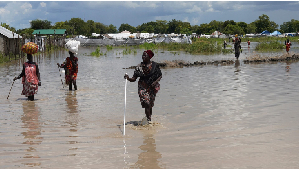Both Sudan and Chad have been hit by flooding, while Lesotho, another country in Africa, is impacted by drought, a UN spokesman said on Monday.
The UN Office for the Coordination of Humanitarian Affairs (OCHA) is warning that heavy rains and flooding have been impacting about half a million people in Sudan's South Darfur, Red Sea, River Nile and Northern states since late June, said Stephane Dujarric, chief spokesman for UN Secretary-General Antonio Guterres, at a daily briefing.
The severe flooding is worsening an already dire humanitarian situation in Sudan. In areas at risk of famine, including in El Fasher, the capital of North Darfur, about 124,000 people have been affected by heavy rains, he said.
Flooding and stagnant water are heightening the risk of diseases spreading, with nearly 2,900 suspected cholera cases reported since the start of the latest outbreak in mid-August.
Dujarric said the United Nations and its partners are on the ground aiding those who need assistance.
Last week, aid organizations delivered life-saving therapeutic food to treat 6,000 children suffering from severe acute malnutrition in the city of Nyala in South Darfur.
In Chad, OCHA said flooding continues to get worse across the country. According to authorities, at least 340 people have been killed, nearly 1.5 million people are now impacted by the floods, and more than 160,000 homes have been destroyed.
The floods are also impacting agriculture, and nearly 3.4 million people are facing acute hunger in the current lean season, Dujarric said, adding that Chadian authorities, UN agencies and partners are providing food and nutrition supplies.
The spokesman said Acting UN Emergency Relief Coordinator Joyce Msuya has increased the allocation from the Central Emergency Response Fund (CERF) to support the floods response in Chad from 5 million U.S. dollars to 8 million dollars.
Meanwhile, OCHA reported that the food security situation in Lesotho, a landlocked country in southern Africa, is deteriorating following a historic drought caused by El Niño.
On average, agricultural production in the country has decreased by one third, and nearly a third of the population -- or 700,000 people -- are facing food insecurity in the coming months, Dujarric said.
The acting UN emergency relief coordinator has allocated 2 million dollars from the CERF toward the drought, and Assistant Secretary-General and Climate Crisis Coordinator Reena Ghelani recently visited the country to assess the drought's impact and call for more international support, he said.
Click to view details



Africa News of Wednesday, 11 September 2024
Source: theeastafrican.co.ke

















